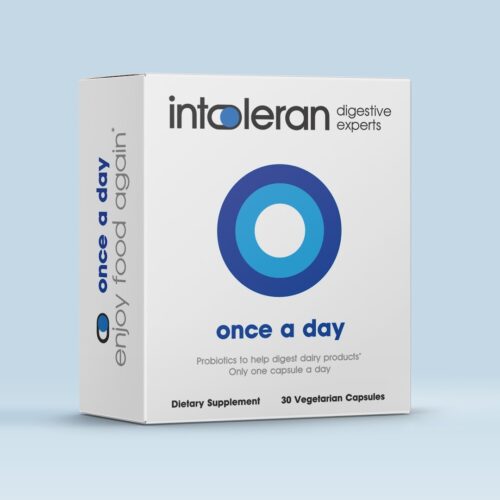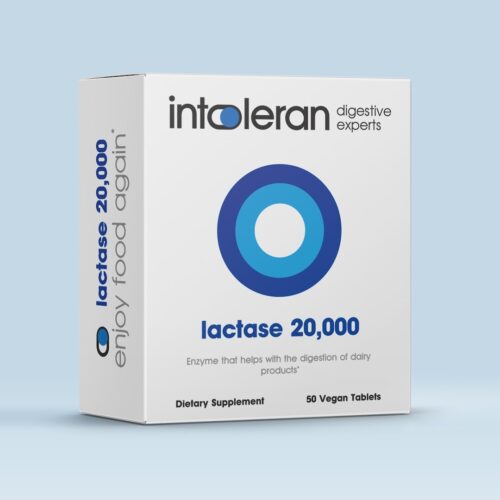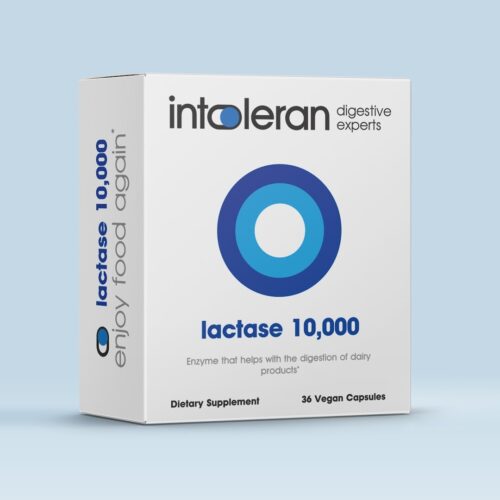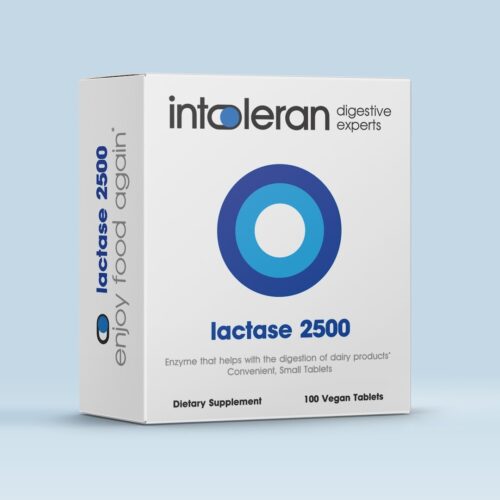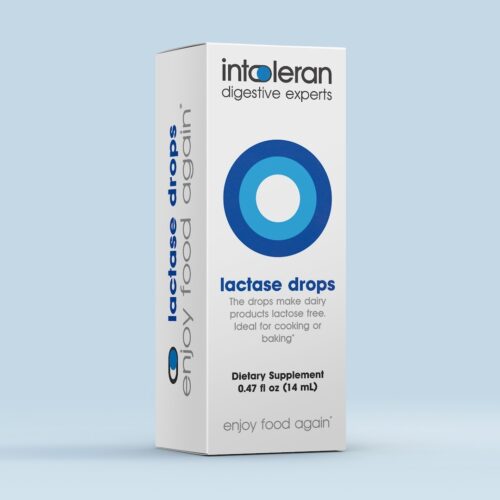Lactose is a type of sugar found in milk and other dairy products, among others. Lactose is normally broken down in the small intestine. There, the lactase enzyme splits lactose into glucose and galactose so the intestinal wall can absorb it. Read more about lactose intolerance below.
what is lactose intolerance?
If you suffer from lactose intolerance, then there is a shortage of the lactase enzyme or the enzyme is missing completely. In this case, lactose cannot be split up, so it cannot be absorbed in the small intestine.
If lactose is not digested properly, it ends up in the large intestine, where the intestinal bacteria still try to break it down through fermentation. In this fermentation process, the intestinal bacteria break down the lactose, which can cause unpleasant intestinal complaints.
This video shows what lactose intolerance is.
There are different kinds of lactose intolerance, each with a different cause. The most common cause is the decrease in lactase production with age. In some cases the body’s production of lactase decreases from the age of three, this is called primary lactose intolerance. In Northern Europe, this occurs in about 1 in 10 people. This is much less than, for example, in Asia, Africa, and America where up to 80% of the population is lactose intolerant.
The second type of lactose intolerance is secondary lactose intolerance. In this case, the body is unable, or less able, to produce the lactase enzyme due to an acute cause. Causes include an intestinal infection, intestinal surgery, or other damage to the intestine. Sometimes this type of lactose intolerance is temporary: when the intestine has recovered, lactase production will resume.
The third type is congenital lactose intolerance, in which there is a large deficiency of the lactase enzyme from birth or the lactase enzyme is completely absent. Infants with this type of lactose intolerance do not tolerate breast milk because it contains lactose. Congenital lactose intolerance is genetic and will persist for life.
Some people do not react to lactose but do react to a certain protein found in milk (cow’s milk protein). Cow’s milk protein allergy is less common than lactose intolerance and expresses itself as an allergic reaction. In lactose intolerance, lactose cannot be properly digested and is a non-allergic food hypersensitivity. In cow’s milk protein allergy, there is an allergic hypersensitivity to cow’s milk protein.
which foods contain lactose?
Most commonly found in milk, lactose can also be found in several other foods. Below you will find the most common products containing lactose. Not every product contains the same amount of lactose, and the products that cannot be tolerated can vary from person to person.
- Milk and dairy products such as yogurt, custard, and quark
- Cheese (especially fresh cheeses such as cream cheese and cottage cheese)
- Cookies and cakes
- Ice cream and milkshakes
- Whipped cream and other types of cream
- Butter
In addition, there are a lot of other products that contain lactose, but often in such small amounts that most people can still tolerate it. If your body does not produce any lactase enzyme, it is possible that very small amounts of lactose can cause symptoms. This can happen, for example, with certain types of medication that contain a small amount of lactose.
Note: even ‘lactose-free’ (dairy) products often contain a small amount of lactose. If you have severe reactions to lactose, you may still experience symptoms.
how do you recognize lactose intolerance?
Complaints associated with lactose intolerance are caused by the fermentation process in the colon. During this process, in which the intestinal bacteria try to break down the undigested lactose, moisture is attracted and gas can be released. This can cause you to suffer from unpleasant intestinal symptoms. The most common complaints and symptoms of lactose intolerance are:
- A bloated belly
- Congestion (obstipation)
- Diarrhea
- Intestinal cramps
- Flatulence
Complaints such as nausea and fatigue may also occur. The type of symptoms and degree of discomfort is different for each person.
what you can do about lactose intolerance
Lactose intolerance can often not be cured and therefore stays with you all your life. Fortunately, it is easy to live with and you can do a lot to reduce your symptoms. There are also a number of useful tools that help you to enjoy food again, even if it contains lactose.
The first and most obvious solution to lactose intolerance is a lactose-free or lactose-poor diet. Using this method, you would eat as few products containing lactose as possible to prevent symptoms. You can choose lactose-free or plant-based alternatives. If you can still tolerate a small amount of lactose, it is usually sufficient to avoid foods rich in lactose. If you react to small amounts of lactose, then a completely lactose-free diet is a better option. A dietitian can help you make choices about a lactose-free or low-lactose diet.
The elimination of lactose from your diet can sometimes be quite difficult and also quite restrictive. For example, if you eat out or just fancy something tasty that contains lactose, such as a pastry or ice cream. In that case, a supplement can provide a solution. There are supplements in tablet or capsule form that contain the lactase enzyme. You take them during the lactose-containing meal so that you can still digest the lactose. Besides capsules and tablets with the lactase enzyme, there are also drops with liquid lactase. With these drops, you can make liquid dairy products lactose-free, to cook with, for example. Finally, there are also probiotics with lactase-producing characteristics that you can take if you are lactose intolerant. In this way, your body can still produce lactase in the intestines so that you can better digest lactose.
Our supplements for lactose-intolerance help you digest lactose from dairy products.
our products for lactose-intolerance

free advice from our dietitians
Digestive complaints? Let us help you, like we’ve helped many others. We will help you to find the solution that fits your needs best.
Fill out our contact form and we will get back to you


 EN
EN NL
NL IT
IT FR
FR ES
ES AU
AU SG
SG